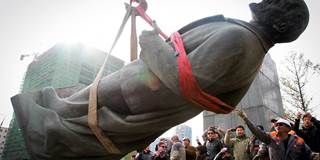The Power of Monuments
Why should public spaces in the US be purged of images of Confederate leaders, while statues of Admiral Nelson and Cecil Rhodes still stand in Britain? The way we tell stories of our past, and keep memories alive in cultural artifacts, is a large part of how we view ourselves collectively.
NEW YORK – The ghastly spectacle last month of neo-Nazis marching through Charlottesville, Virginia, carrying torches and barking slogans about the supremacy of the white race, was sparked by the city’s plans to remove a statue of Robert E. Lee, the leader of the Confederate army, which fought to retain slavery in the secessionist South during the American Civil War. The statue of General Lee on his horse has been there since 1924, a time when the lynching of black citizens was not a rarity.



NEW YORK – The ghastly spectacle last month of neo-Nazis marching through Charlottesville, Virginia, carrying torches and barking slogans about the supremacy of the white race, was sparked by the city’s plans to remove a statue of Robert E. Lee, the leader of the Confederate army, which fought to retain slavery in the secessionist South during the American Civil War. The statue of General Lee on his horse has been there since 1924, a time when the lynching of black citizens was not a rarity.